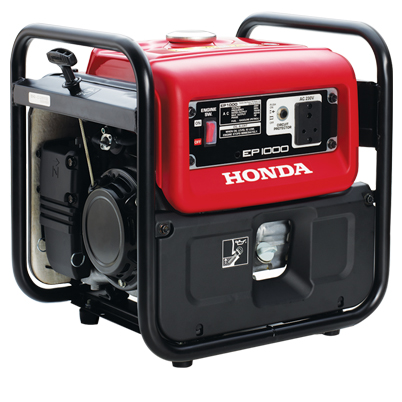Understanding The Way Generator Work
17 May 2023

Generator is one of engine that helps many of daily human activities. It is especially important when the electricity supply from the central electricity provider is interrupted.
with the aim that you know not only it based on its use, this time we will try to explain how a generator works in detail, and hopefully below information could help you understand why it is important to have a generator at home. Let's start the discussion right away!
Generator Parts
Before learning how a generator works, you need to know what components that makes up a generator. Here are the parts:
1. Engine
The engine is a source of mechanical energy which drives the generator. Without an engine, it is impossible for the generator to get turn on and provide electricity.
2. Alternator
The alternator consists of 2 parts, namely:
- Rotor which is the moving part of the coil.
- Stator which is the stationary part of the coil.
3. Voltage regulator
The voltage regulator is the part that controls the output voltage of the generator. This component is crucial considering that the outgoing electric current must be stable.
4. Control Panel
Control panel is an interface part between the user and the generator itself through the features on the generator.
How Generators Work
Before getting into how it works, you need to know that generators are not only used in households. Other big businesses are also using this technology so that customer needs can still be met.
Some businesses that use generators are hotels, villas, factories, airports, hospitals, and many more. Its use is not only for the sake of customer needs, but also for benefits that each business person gets.
Stopping production, packaging, processing, and other processes can reduce profits, as a result, revenue decreases, losses occur due to damaged materials, and even business credibility in the eyes of customers can be lost. So the usefulness of generators for daily activities is indeed unquestionable.
Then how does this machine work? In short, a generator is a machine that produces electricity by converting mechanical energy into electrical energy. This energy change uses the principles of electromagnetic to produce an electric current through the use of magnets.
More detailed explanation can be seen in the following steps:
- After the machine is turned on, it will move the rotor.
- The rotor is an electrical component in the form of a coil of copper wire which can rotate.
- When the rotor rotates, the rotor generates a magnetic field which induces the stator to produce an electric current.
- If the electric load is higher, the pole coil will be given a direct voltage by the voltage regulator to create a larger magnetic field that rotates on the surface of the pole. In the end the electrical power generated will be as needed.
Generator Types
Did you know that there are many types of generator? Generators that are currently sold in the market do not always function to convert mechanical power to electricity or vice versa, but some also function to adjust the voltage produced. Read more below.
1. Condenser
Condenser type generator is a generator that functions to adjust the conditions in electric power transmission. This generator is also often used to reduce electrical power surges as needed.
2. AVR (Automatic Voltage Regulator)
Stability of the electricity supply from the generator to various electronic devices is very important. When the voltage becomes unstable, the risk of damage to the connected equipment becomes very large.
That's why the existence of AVR is crucial because it can make the resulting electric voltage constant and stable. No matter how much load is charged, the AVR generator will continue to provide the same voltage.
3. D-AVR (Digital Automatic Voltage Regulator)
D-AVR has the same work function as AVR, but more advanced in terms of stability of electricity supply. This occurs when there is a change during operation of approximately 1%. The advantage also lies in the protection by the thermistor from excessively high temperatures.
4. Inverter
Inverter generators are the latest technology that many people are looking for because their fuel consumption is more efficient, and that means you can make savings in purchasing the required fuel. In addition, efficient fuel means less exhaust emissions, aka friendly to the environment.
Use of Generators
Generators have various uses for daily household activities. Generators also make it easier for you to meet various business needs in one place or mobile. Here are some of the benefits of using generators.
1. Generate Electrical Energy (AC power)
The existence of a generator is indeed very important, especially for consumers who are mobile or have an outdoor hobby.
When the main power source is off or you are in a place where there is no electricity source, the generator can directly replace the main electricity source to turn on various electronic and electrical devices.
So there is no need to be confused anymore when the main power source dies even though the work is not finished. All you have to do is turn on the generator, then you will get a power source again at home.
2. Support Mobile Business Activities
The existence of a generator can also be used for mobile business. The definition of mobile can be interpreted as a business that requires an internet network and or a business that moves from one place to another.
For businesses that require an internet network, the modem must be continuously on. When the electricity from the PLN goes out, the staff must be alert to turn on the generator so that the internet does not go down and hinder operational activities such as at a bank.
Then for businesses that move from place to place such as food trucks, generators are useful for providing the electricity supply needed when cooking and others.
3. Preventing Business Losses
Not only for turning on electronic devices for basic household needs, generators enable you to continue your activities to produce business products. Imagine if you could produce 100 pcs of products a day, how much would the number of products decrease if the electricity went out?
Of course the production target was not achieved and this affected revenue and business development. Then the delay of goods to customers will affect the credibility and integrity of your business
So it is very important to make additional plans and preparations when there is a power outage that makes all machines stop carrying out production activities, one of which is by using a generator.
Having a generator can keep production going and produce the same amount of product as usual. Achieved targets, finances are secure, income remains stable, and customers are happy because the products they buy arrive on time.
4. Fuel Consumption
Generator fuel consumption depends on its engine. Generators with 4 stroke engines are said to be more efficient than generators with 2 stroke engines. This happens because the components installed are different.
Now you understand more about the importance of having a generator, isn't it? Don't forget to do research and comparisons when buying a generator. Choose the electric capacity you want then choose the most appropriate.
Do not need to be confused about finding a good quality generator because Honda Power is here to meet your home and business electricity needs. The series of generators from Honda Power are definitely of high quality since it only use the best engines and parts.
The fuel consumption is also very efficient so it saves your expenses. The sound of the generator isn't even too loud so it's still comfortable to use.
In addition, you don't need to spend a lot of energy because almost all Honda generator products are started with a motor starter.
Find the best and most reliable generator according to your needs only at Honda Power Products.

HONDA POWER PRODUCTS INDONESIA
Honda Power Products menyediakan anda Mesin Serbaguna, generator, pemotong rumput, pemotong sikat, anakan, pompa air, dan Mesin tempel.






